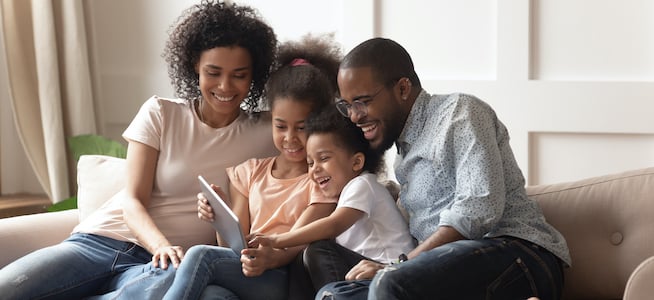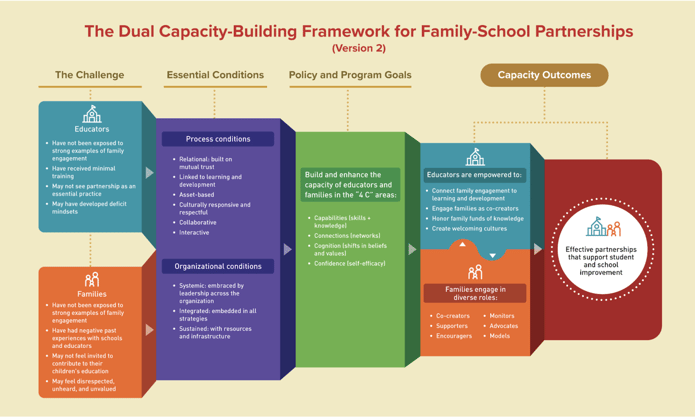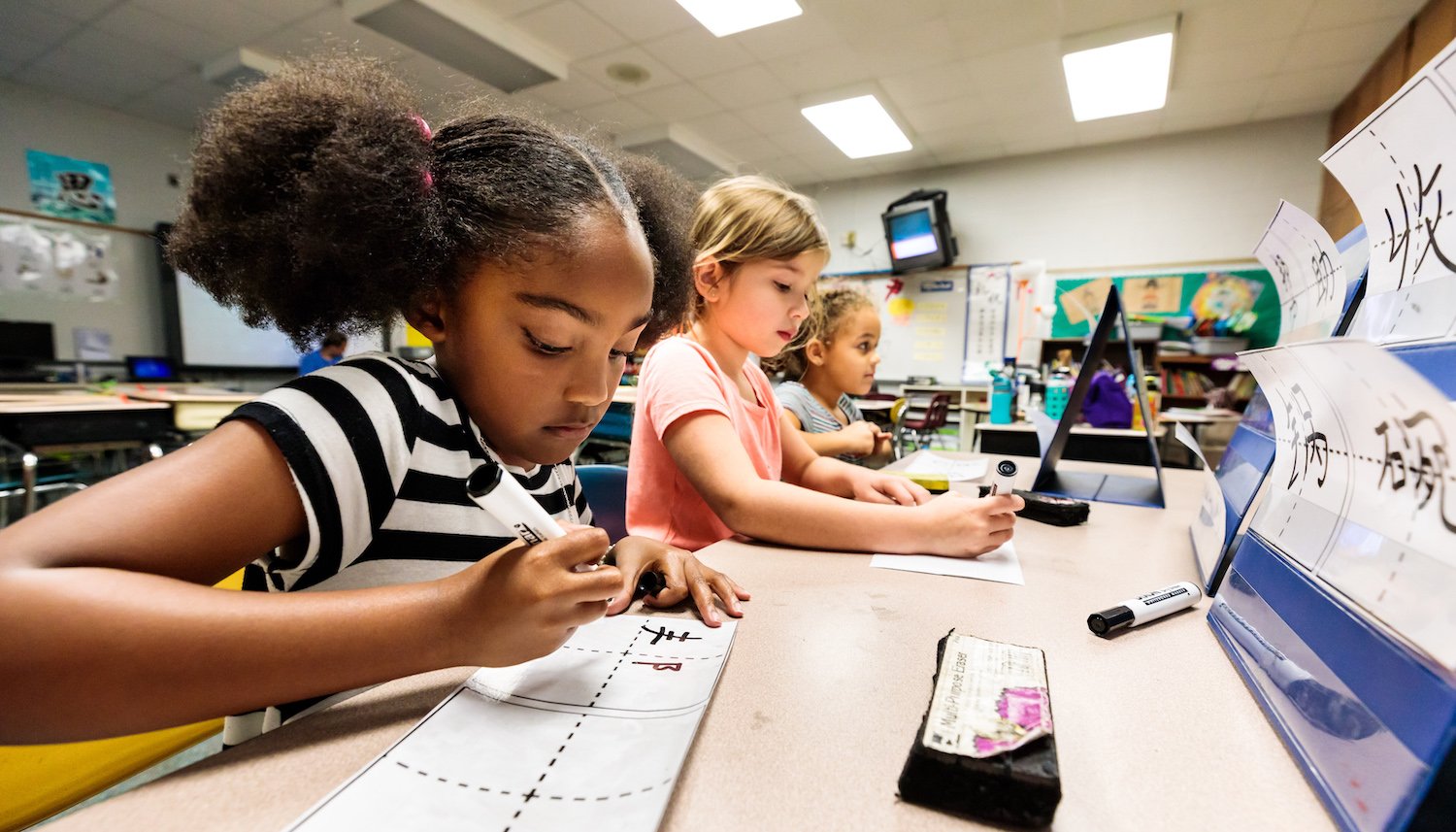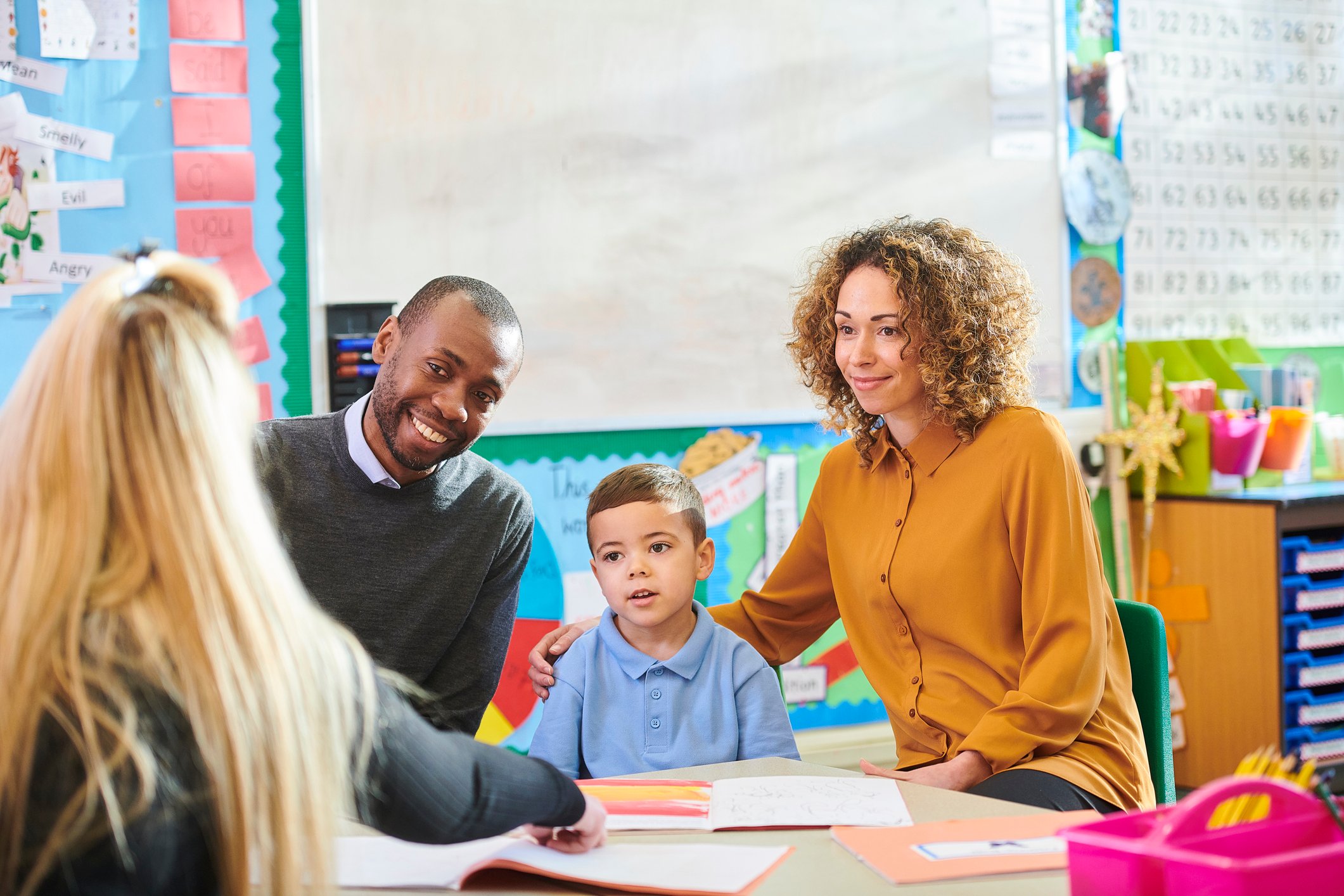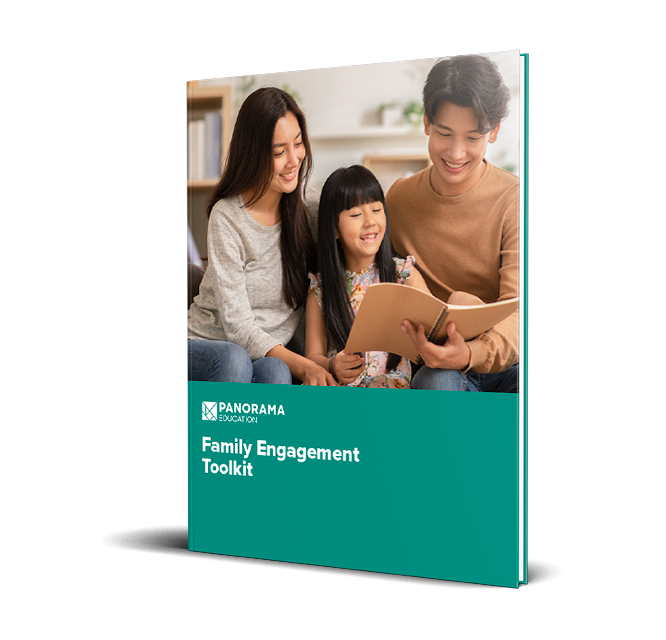Across the country, schools are welcoming students back into buildings for the 2021-22 year—some for the first time in over a year. As we face these changes and challenges, it’s also a time of great opportunity: Educational leaders have a chance to build on the connections made during the pandemic and to strengthen the relationship between schools and families for the better.
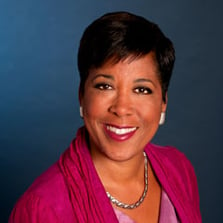 Dr. Karen Mapp sees the present day as a pivotal time for family engagement: “This is the moment where we can have an impact on changing the practice of family engagement, now and forever.” A senior lecturer at the Harvard Graduate School of Education, Mapp has spent the last 25 years researching partnerships among families, community members, and educators. Her work seeks to elevate successful family-school partnerships and help schools build trusting relationships with families as co-creators in their children’s learning.
Dr. Karen Mapp sees the present day as a pivotal time for family engagement: “This is the moment where we can have an impact on changing the practice of family engagement, now and forever.” A senior lecturer at the Harvard Graduate School of Education, Mapp has spent the last 25 years researching partnerships among families, community members, and educators. Her work seeks to elevate successful family-school partnerships and help schools build trusting relationships with families as co-creators in their children’s learning.
On a March 2021 webinar with Education Week, Mapp shared her research-backed framework for building family-school partnerships and how to use it to inform reopening plans for back-to-school 2021-22. Explore Mapp’s insights below, as well as strategies and tools aligned to her framework from Demetrius Lancaster of Panorama Education and Elisabeth Stock of PowerMyLearning.
“A full, equal, and equitable partnership.” (Click to Tweet!)
To frame her work, Mapp uses a definition of family engagement that was developed by a coalition of educators, families, and policymakers in Connecticut. The term “families” encompasses all adult caretakers, not just parents.
“Family Engagement is a full, equal, and equitable partnership among families, educators, and community partners to promote children’s learning and development from birth through college and career.”
Through her years of research and practice, Mapp has had countless conversations with educators and families. While both groups are dedicated to children’s success, she has identified the following challenges in the field:
- Many educators have not been exposed to strong examples of family engagement.
- Traditional practices often focus mainly on compliance, such as homework checks. In addition, volunteer participation in existing school structures can be inaccessible for some families and perpetuate systems of oppression.
- Few educators receive training in family engagement, making it difficult to create more inclusive and equitable strategies.
- Traditional family engagement practices can lead to families feeling disrespected, unvalued, and excluded from contributing—which reinforces the harm caused by past negative experiences with the education system.
- When strategies fail, the onus is placed on families, creating a harmful, false narrative that families don’t value education or don’t want to be engaged.
Based on her research, Mapp developed and launched The Dual Capacity-Building Framework for Family-School Partnerships. She released Version 2 in 2019 with a revamped graphic to highlight the flow from ineffective to effective partnership.
Pictured Above: The 2019 version of The Dual Capacity-Building Framework for Family-School Partnerships
The framework takes the initially separate groups of educators and families through a process of examining essential conditions and developing policy and program goals. The outcome is an effective, collaborative partnership to support students. “This is all in service of supporting not only student improvement, but school improvement as well,” said Mapp.
“Relational trust is the glue that holds everything else together.” (Click to Tweet!)
“If you skip over the step of building authentic and trusting relationships with your families and the community,” said Mapp, “then all of those wonderful initiatives that you attempt to put into place don’t have a strong foundation on which to sit.” All aspects of the framework are important, but Mapp emphasized that relational trust between families and educators is “the glue that holds everything together.”
There are four key elements of relational trust: respect, competence, integrity, and personal regard. The chart below from Mapp's colleague Eyal Bergman, a Harvard doctoral student who co-authored the 2019 Dual Capacity-Building Framework, is designed to help educators reflect on their interactions with families.
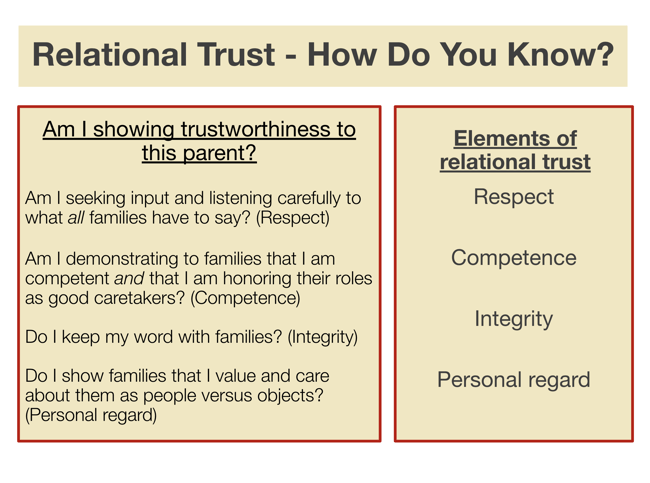
Pictured Above: Bergman’s questions for examining elements of relational trust
Building these relationships takes time, effort, and an understanding of equitable practices. Mapp offered the following recommendations for educators as we return to school buildings this year:
- Build Your Capacity: Examples of resources for professional development from Dr. Mapp include:
- Books: “Powerful Partnerships” by Dr. Karen Mapp and
“Beyond the Bake Sale: The Essential Guide to Family-School Partnerships” by Anne T. Henderson, Karen L. Mapp, Vivian R. Johnson, Don Davies - Class: “Introduction to Family Engagement in Education” with Dr. Karen Mapp
- Webinar: “Building Powerful Partnerships with Families” series with Dr. Mapp
- Conference: National Family & Community Engagement Conference(June 2021)
- Elevate Learning Gains: Look at what children and educators gained from the experience of learning at home with families, and integrate practices rooted in family culture.
- Maintain and Strengthen Relationships: Even after children return to school, educators should continue to reach out to caregivers through relational phone calls and visits (virtual or otherwise). Through these calls, educators can show families that they respect and value their perspectives and insights.
“To change systems, we have to change the conditions.” (Click to Tweet!)
Once schools have built a foundation of relational trust with families, our work to change conditions can begin. “In order to change systems, we have to change the conditions,” said Mapp. The framework emphasizes two categories of Essential Conditions: process conditions, which focus on the ways in which these changes are made, and organizational conditions, which focus on how the changes show up in school and district operations.
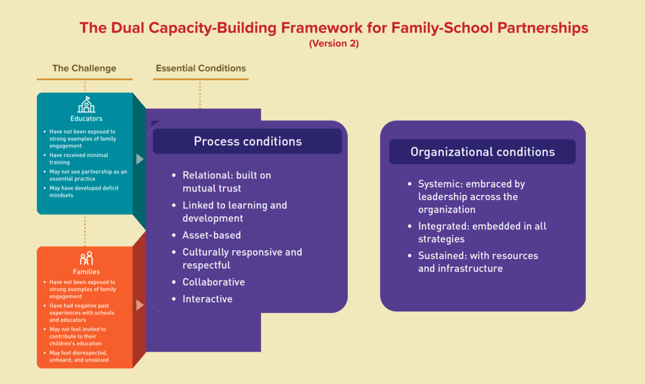
Pictured Above: Process Conditions and Organizational Conditions of The Dual Capacity-Building Framework
Both process and organizational conditions must be met in order to create system-wide change. An example of an engagement strategy that meets process conditions is relational phone calls between educators and caregivers. Checking in with families this way invites caregivers to participate directly with the educator in their children’s learning and development and demonstrates respect, trust, and empathy.
Changing the process, however, is not enough. Districts must also examine the organization as a whole to dismantle oppressive and non-inclusive practices.
“Family engagement is not a program, it’s a practice.”
(Click to Tweet!)
To Mapp, family engagement is not something to simply be implemented. Organizational conditions require that family-school partnerships are embraced by leadership and integrated into the fabric of the school. Quoting Mapp's friend and colleague Michele Brooks, “Family engagement is not a program, it’s a practice.”
One-time events like breakfasts and theme nights may be part of school culture, but they are not enough to form relationships of mutual trust or to involve families as co-creators. Family engagement as a practice means devoting resources towards school-family partnerships; for example, having an office of family engagement with a director focused on instruction, not simply communication.
Through the framework, Mapp hopes educators will be empowered to enter into meaningful, reciprocal relationships with families—and that families will advocate for their children as learners. “Families are already empowered,” she said. “They just need that power to be activated.”
Tools and Strategies for Deepening Family Engagement Practices
Demetrius Lancaster, equity practice lead at Panorama Education, and Elisabeth Stock, co-founder and CEO of PowerMyLearning, shared some of the framework-aligned tools and strategies that schools and districts are using to partner with families and caregivers.
Panorama's Family-School Relationship Survey
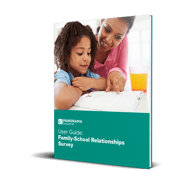 Panorama’s Family-School Relationship Survey elevates family voice to support the development of authentic partnerships. Aligned with Mapp’s Dual Capacity-Building Framework, the survey invites families to share what they need in order to become co-creators in their children’s education. School leaders can then develop actionable, data-driven strategies based on family responses.
Panorama’s Family-School Relationship Survey elevates family voice to support the development of authentic partnerships. Aligned with Mapp’s Dual Capacity-Building Framework, the survey invites families to share what they need in order to become co-creators in their children’s education. School leaders can then develop actionable, data-driven strategies based on family responses.
“If we can listen deeply to what families are saying they need, we can then identify ways to revise our systems-level support to strengthen those relationships and our partnership in pursuit of equitable student outcomes.”
–Demetrius Lancaster, Lead, Equity Practice at Panorama Education
PowerMyLearning's Triangle of Learning Relationships
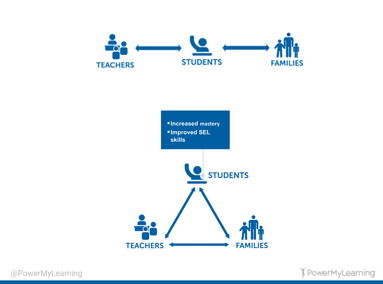 PowerMyLearning’s Framework for Teachers supports educators in activating the power of collaboration between teachers, students, and families and in using family perception data for school improvement planning. The nonprofit also has an exciting innovation called Family Playlists, which encourage children to share what they are learning in school by teaching their families. The playlists help solidify the lessons for students, directly involve parents in their child’s curriculum, and facilitate communication between families. The playlists can be delivered via cell phone and are available in over 100 languages.
PowerMyLearning’s Framework for Teachers supports educators in activating the power of collaboration between teachers, students, and families and in using family perception data for school improvement planning. The nonprofit also has an exciting innovation called Family Playlists, which encourage children to share what they are learning in school by teaching their families. The playlists help solidify the lessons for students, directly involve parents in their child’s curriculum, and facilitate communication between families. The playlists can be delivered via cell phone and are available in over 100 languages.
“Imagine families, teachers, and students working together with relational trust and what that will do for your learning community.”
–Elisabeth Stock, co-founder and CEO of PowerMyLearning
Keep learning with 5 more family engagement strategies from district leaders!


.jpeg)
